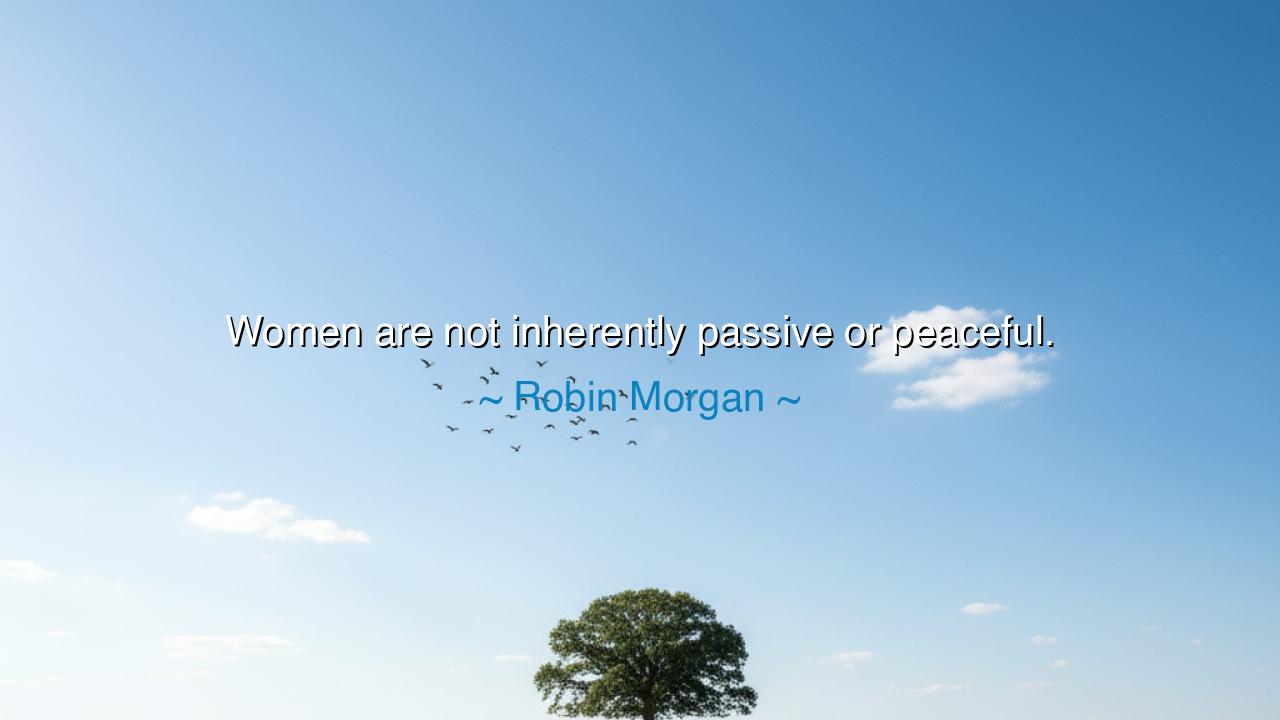
Women are not inherently passive or peaceful.






The words of Robin Morgan, poet, feminist, and warrior of the spirit, strike like a clarion call: “Women are not inherently passive or peaceful.” With this saying, she tears down the ancient myth that women are by nature meek, yielding, and submissive. For too long, society bound women in chains of expectation, praising silence as virtue and obedience as beauty. But Morgan reveals the deeper truth—that within women burns the same fire of defiance, courage, and strength that has ever stirred humankind.
The ancients themselves bore witness to this truth, though they often sought to bury it. The story of Boudica, the Celtic queen, stands as living proof. When Rome ravaged her people and dishonored her family, she did not shrink into passivity. She rose like a storm, leading an army of thousands against the might of the empire. Though she was defeated, her defiance thundered across history. In her fury and her strength, she embodied Morgan’s words: that women, too, carry the will to resist, to fight, to claim destiny with their own hands.
Morgan’s declaration is also a rebuke to the gentle cage society built: that women are natural mediators, mothers only, incapable of the sternness of battle or the sharpness of decision. Yet history offers countless examples to the contrary. From Joan of Arc, who led armies under the banner of divine vision, to the suffragists who endured prison and violence to win the right to vote, women have proven again and again that they are not merely peace-bearers, but also warriors for justice.
The meaning of this quote is therefore twofold. It is liberation from stereotype, and it is empowerment to act. To claim women are “inherently passive” is to rob them of their agency, to bind them in chains of expectation. Morgan calls upon her generation and those to come to break that falsehood, to recognize that women’s power includes not only nurture, but also resistance, rebellion, and the fire of transformation.
Let the generations remember: the spirit of woman is not bound to silence or submission. It can soothe, but it can also roar. It can mend, but it can also rend. To deny this is to deny truth itself. Morgan’s words are a summons—to see women not as pale shadows of peace, but as full beings, capable of both gentleness and ferocity, as history and destiny alike demand.






DHDo Hoang
Morgan’s comment about women not being inherently passive or peaceful is a much-needed reminder that women are multifaceted individuals. How can we challenge the assumption that women must always be nurturing or docile? Is it time for a broader understanding of womanhood, one that allows for assertiveness, anger, and strength to be just as valued as compassion and peace? How do we ensure that women are allowed to express all their emotions freely?
KTLe Ngoc Khanh Tang
I find Robin Morgan’s quote eye-opening, as it highlights the way society has confined women to passive, peaceful roles for so long. How much of this stereotype has affected how women see themselves and their potential? How do we encourage women to embrace more diverse and powerful expressions of themselves without fear of backlash? Are we ready to redefine what it means to be a woman in a world that values both strength and empathy?
GDGold D.dragon
Morgan’s statement is powerful, especially in a world where women have historically been expected to be calm, gentle, and compliant. Does this stereotype still persist in modern culture, even as more women take on roles of authority and activism? How do we combat the lingering expectations that women should be peaceful or non-confrontational? Is it possible for women to embrace their full range of emotions and behaviors without being judged or criticized?
VTHa Van Tu
Robin Morgan’s quote challenges the long-standing stereotype that women are naturally passive or peaceful. This perception has been ingrained in society for centuries, often limiting women’s roles to caregivers or supporters. But what does it mean for women to break free from this stereotype? How can we shift societal expectations to acknowledge the full range of traits women can possess, including strength, assertiveness, and leadership?